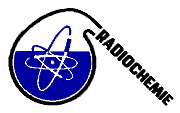Speaker
Dr
Ivo Světlík
(Nuclear Physics Institute AS CR, Na Truhlarce 39/64, 180 86 Prague)
Description
The gross alpha activity is defined as the total activity of the alpha emitters. Gross alpha and beta activity screening methods have been developed to determine if radionuclides specific analysis is required to further characterize the water. There may be a loss of radionuclides during storage of water sample caused by the adsorption onto the container wall and by the precipitation and coprecipitation. It is generally recognized, however, that these effects can be minimized by acidification of the samples after collection utilizing HNO3 or HCl.
Polonium 210 is an alpha emitter, a member of the uranium decay series. This radionuclide originates by radioactive decay of 222Rn. In water with elevated amount of 222Rn, the presence of 210Po can contribute significantly to the measured value of the gross alpha activity.
The methods for gross alpha activity analysis of drinking water are often based on sample evaporation and heating at the temperatures exceeding 100 oC. At such temperatures, can 210Po become volatile in dependence of its chemical form and therefore the gross alpha activity can be underestimated. Our contribution will compare and discuss several routines of sample preparation considering the possible losses of 210Po.
Primary author
Dr
Ivo Světlík
(Nuclear Physics Institute AS CR, Na Truhlarce 39/64, 180 86 Prague)
Co-authors
Ms
Alena Belanova
(Water Research Institute, Nabrezie arm. gen. L. Svobodu 5, 812 49 Bratislava, Slovakia)
Dr
Diana Ivanovova
(T. G. Masaryk Water Research Institute, Podbabska 30, 160 00 Prague, Czech Republic)
Dr
Eduard Hanslik
(T. G. Masaryk Water Research Institute, Podbabska 30, 160 00 Prague, Czech Republic)
Dr
Jana Meresova
(Water Research Institute, Nabrezie arm. gen. L. Svobodu 5, 812 49 Bratislava, Slovakia)
Ms
Lenka Tomaskova
(Nuclear Physics Institute AS CR, Na Truhlarce 39/64, 180 86 Prague)
Dr
Marta Vrskova
(Water Research Institute, Nabrezie arm. gen. L. Svobodu 5, 812 49 Bratislava, Slovakia)
Ms
Tereza Novakova
(Nuclear Physics Institute AS CR, Na Truhlarce 39/64, 180 86 Prague)

